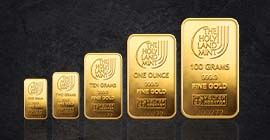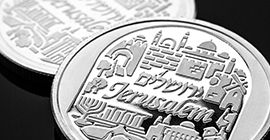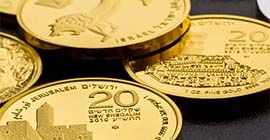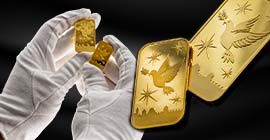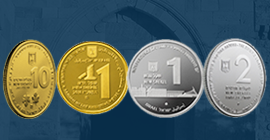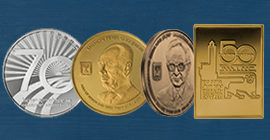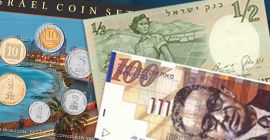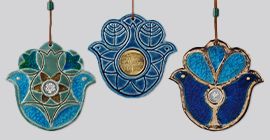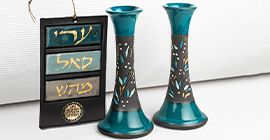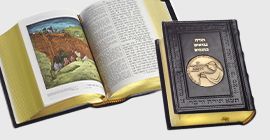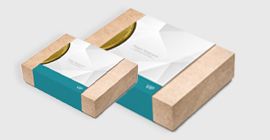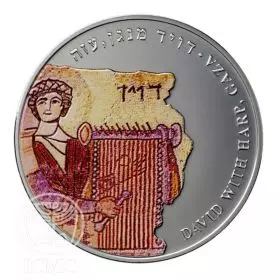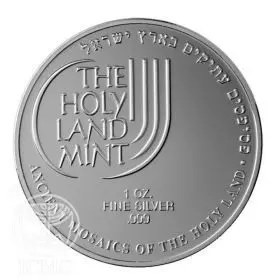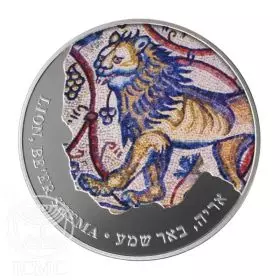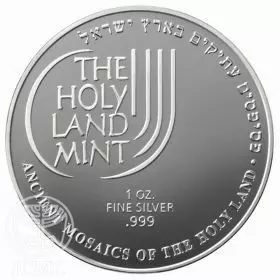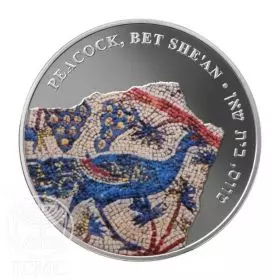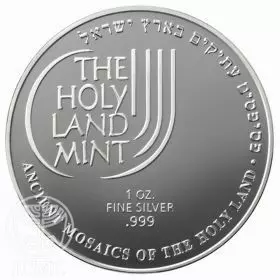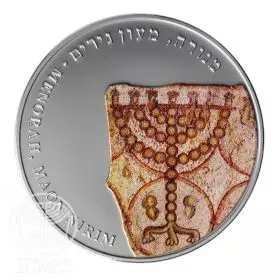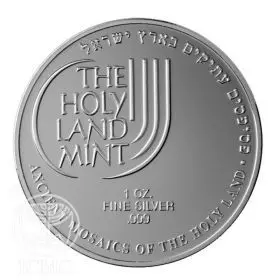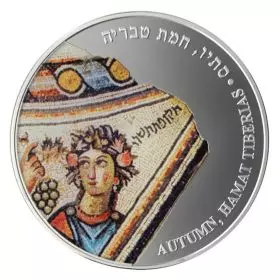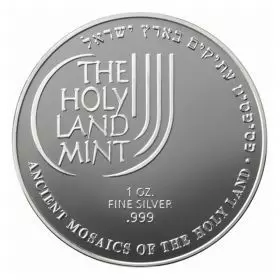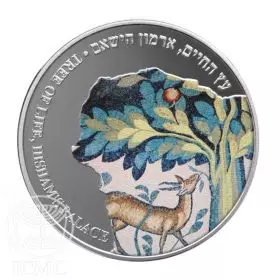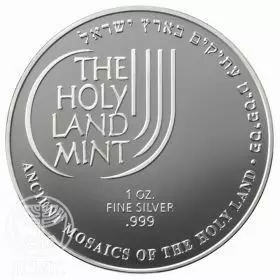Pomegranates
Silver 999, 38.7 mm, 1 oz.
SKU
21870390
متوفر
$240.00
المواصفات
| سنة الاصدار | 2013 |
|---|---|
| معدن | فضة |
| درجة النقاء | 999 |
| وزن | 1 oz. |
| قطر | 38.7 mm |
| الحد الأقصى لسك العملة | 888 |
| تصميم | Meir Eshel |
"POMEGRANATES" MOSAIC FROM A SYNAGOGUE IN MAON NIRIM
Official Medal, 2013/5773
3RD GOLD MEDAL IN THE "ANCIENT MOSAICS IN THE HOLY LAND" SERIES
Maon, known today as Horvat Maon or Khirbat al-Main in Arabic, was an ancient city situated 20km southwest of Gaza. In 2009, the Jewish National Fund turned the site into a Tourist Center and maintains the Center, today.
The city developed in the fourth century, at the start of the Byzantine period, when it was known as "Menois". Maon was of strategic importance because it was situated on the "limes Palestinae", the Roman defense layout, a security belt along the southern border. In the Byzantine period, a Jewish Community developed there, reaching the height of its glory, in the sixth century and gradually declining in the 8th century, during the first Islamic period. This community was part of a chain of Jewish settlements in the south of the Land of Israel, which stretched from the Coast of Gaza in the west, to Mount Hebron and the Dead Sea Shores in the east. The period in which the Jewish community flourished corresponded to the time of the Tanaim and Amoraim, teachers of the Oral Law, the Mishna and Gemara. This was a time of prosperity for the population in the Galilee and Golan Heights, in the north of the Land of Israel. According to archeological finds, the community in Maon, in the southern part of the Land also prospered.
In 1957, while paving a road, the remains of a Synagogue were discovered. Experts believe that the foundations of the construction date from the 5th century. In the mid 6th century, repairs were carried out, during which the floor was raised. The old mosaic was exchanged for a new and beautiful mosaic, made from stones and glass, with 18 different color shades. This impressive artistic work, which partially survived, depicts a vine growing out of an amphora, with its trellises forming 11 rows of loops, in which are animals and birds. The upper rows are decorated with Jewish symbols, and especially the seven-branched candelabrum (the Menorah, which is the feature of the first medal and the common side of each of the medals in the series). In the center of the sixth row of loops is a basket full of pomegranates. Many have wondered if the artist intended to convey a message with this motif.
The mosaic abounds in Jewish motifs, easily recognized from other Synagogues of this period. The animals, however, that appear in some of the loops are not characteristic of Jewish symbols, for example the peacock, elephant, giraffe and hare. Furthermore, this mosaic resembles the floor mosaic of a church of this period, discovered at Horvat Shalala in the Besor region, which today is preserved in Australia. The two mosaics may have been created by the same artist. Nevertheless, since most of the motifs do represent the yearning of the people for the Temple in Jerusalem, which had been destroyed about 500 years before the creation of the mosaic floor in Maon, it can be presumed that the basket was meant to represent the precept of the bringing of the first fruits to the Temple. When the Temple existed, the Jews living in the Land of Israel would take "the first of every fruit", placing the fruits on a basket, similar to the one depicted in the mosaic, and would joyfully bring them to Jerusalem (Deuteronomy 26). The message of the mosaic seems to be "Renew our days as of old" (Lamentations 5:21)
Obverse: Part of the Mosaic Floor of a 6th century CE Synagogue in Maon, southwest of Gaza, depicting a basket of plants with pomegranates, alluding to the first fruits brought to the Temple in Jerusalem as from the Festival of Shavuot.
Reverse: Inscription "Ancient Mosaics of the Holy Land" in Hebrew and English, the metal weight and fineness and the Holy Land Mint Logo (the international logo of ICMC).
Edge: Smooth with serial number.
Designer: Meir Eshel.
Engraving: Switzerland.
Mint: Switzerland.
اسم الاصدار: رمان - الفسيفساء القديمة
اسم السلسلة: فسيفساء قديمة في اسرائيل
| رقم الكتلوج | tbl_condition | قطر | سعر الاصدار | سنة الاصدار | معدن | كمية | وزن |
|---|---|---|---|---|---|---|---|
| 31870390 | 38.7 mm | Unavailable Info | 2013 | Gold 9999 | 360 | 1 oz. | |
| 21870390 | 38.7 mm | 549 NIS | 2013 | Silver 999 | 888 | 1 oz. |

